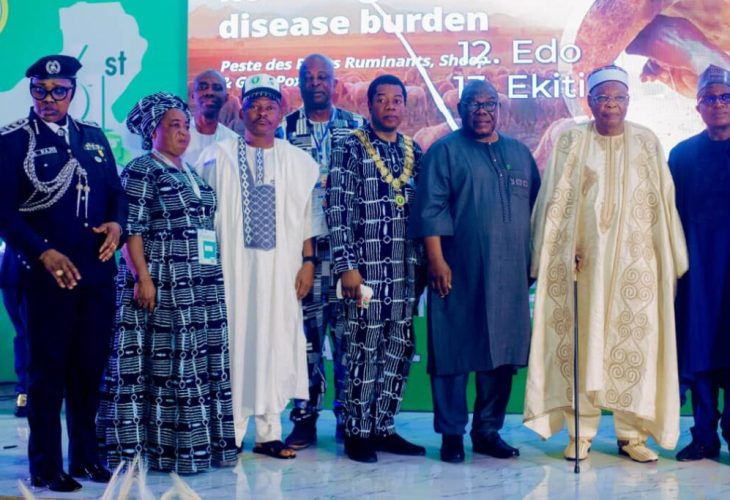- +234 812 612 3993
- Open: 09.00 - 17.00
Send Us a Message
Contact Info
- No 8(Plot 434) Zambezi Crecent, Maitama
- +234 812 612 3993
- info@vetsnigeria.org.ng
Veterinarians Call For Declaration Of ‘State Of Emergency’ On Abattoirs
- Home
- Veterinarians Call For Declaration Of ‘State Of Emergency’ On Abattoirs

05Nov’25
Nigeria’s Veterinarians have called on the government to declare a state of emergency on abattoirs across the country, insisting that all slaughter operations should be conducted under proper veterinary supervision to protect public health.
Veterinarians made the call in Jalingo, Taraba State, at a three-day Congress, with the theme, “Animal Health, Food Safety and Security: Ensuring a Healthy and Productive Nigeria,” which brought together hundreds of delegates — from veterinary experts and researchers to policymakers, private sector players, and students — to rethink the future of livestock management and public health.
Dr Moses Arokoyo, President of the Nigerian Veterinary Medical Association (NVMA), who presented the key policy proposals at NVMA’s 61st Annual National Congress and Annual General Meeting in Jalingo, underscored the pivotal role of Veterinarians in national health and food systems. The NVMA presented far-reaching resolutions to reform animal health governance, strengthen food safety, and elevate professional standards across the country.
In what many hailed as a milestone for professional equity, the Congress also approved a minimum salary of ₦200,000 for new entrant veterinarians employed in private hospitals and clinics nationwide.
In his key policy proposals, Arokoyo described the move as “a step toward restoring the dignity of veterinary practice and ensuring professional welfare aligns with national standards.”
He lamented the under-utilisation of Nigeria’s vast livestock resources estimated at over 400 million animals, attributing this ugly development to inadequate veterinary presence at the grassroots, with many Local Government Areas lacking resident Veterinarians.
“Animal health is the foundation of food security and public health. Yet we are losing billions to preventable diseases. “If properly harnessed, veterinary services can generate billions in GDP and create sustainable rural livelihoods,” Arokoyo said.
He called on the Federal Government to implement the 65-year retirement age for all healthcare workers, inclusive of Veterinarians, and urged states to ensure domestication of the new Federal Ministry of Livestock Development (FMLD) to strengthen livestock governance in all the states of the federation.
Delivering the keynote address on behalf of Governor Mohammed Umar Bago of Niger State, Dr Jonathan Wasa, Permanent Secretary, Ministry of Livestock and Fisheries, underscored the inseparable link between animal health, food safety, and economic resilience.
He outlined Niger State’s progress in transforming the livestock sector — including the employment of 21 Veterinarians and 27 technologists, the launch of the Pasture and Grazing Reserve Development Programme, and the introduction of the Veterinary Inspection Permit and Trade Animal Movement Security (VIPTAMS) system for disease traceability and livestock movement control.
“Healthy animals mean healthy people and a healthy economy,” Bago said through his representative.
“Our goal is to integrate animal, human, and environmental health — the true spirit of the One Health approach.” He encouraged Veterinarians to take leadership positions in policy, governance, and investment, saying the profession has “the expertise and credibility to drive sustainable growth in agriculture and food security.”
The Congress also inaugurated a 33-member NVMA Think Tank to design a strategic roadmap for the future of the veterinary profession, spanning education, research, regulation, and global engagement.
Another highlight was the unveiling of the NVMA Lapel Pin, symbolising the association’s renewed identity and commitment under the slogan: “Veterinarians: Safeguarding Animal and Public Health”
At the close of the Congress, NVMA reaffirmed its commitment to positioning veterinary medicine as a cornerstone of national development.
In the communiqué signed by Dr Grace Sabo Nok (Chairman), Dr Abdulkadeer Umar Baba (Secretary), and Dr James Clinton Shawulu (Member), the Association pledged to champion policies that ensure safe food, healthy animals, and a resilient economy.
“We move forward united in purpose, driven by science, and committed to a healthier, safer, and more productive Nigeria,” the communiqué concluded.
From the energy in Jalingo, one message stood out unmistakably — Nigeria’s Veterinarians are no longer content with the sidelines. They are stepping up as the nation’s first line of defence for health, food security, and sustainable growth.
The three-day event reflected a strong push for innovation, collaboration, and renewed national commitment to food system transformation.
written by Chibuzor Emejor November 3, 2025


Leave Your Comment